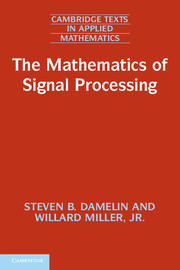Book contents
- Frontmatter
- Contents
- Preface
- Introduction
- 1 Normed vector spaces
- 2 Analytic tools
- 3 Fourier series
- 4 The Fourier transform
- 5 Compressive sampling
- 6 Discrete transforms
- 7 Linear filters
- 8 Windowed Fourier and continuous wavelet transforms. Frames
- 9 Multiresolution analysis
- 10 Discrete wavelet theory
- 11 Biorthogonal filters and wavelets
- 12 Parsimonious representation of data
- References
- Index
12 - Parsimonious representation of data
Published online by Cambridge University Press: 05 June 2012
- Frontmatter
- Contents
- Preface
- Introduction
- 1 Normed vector spaces
- 2 Analytic tools
- 3 Fourier series
- 4 The Fourier transform
- 5 Compressive sampling
- 6 Discrete transforms
- 7 Linear filters
- 8 Windowed Fourier and continuous wavelet transforms. Frames
- 9 Multiresolution analysis
- 10 Discrete wavelet theory
- 11 Biorthogonal filters and wavelets
- 12 Parsimonious representation of data
- References
- Index
Summary
An important theme in this book is the study of systems y = Φx. We have looked carefully at the case when Φ is linear and can be taken as an m × n matrix or more generally a linear operator on a Hilbert space. In the various applications we have considered thus far, x is the signal or input, Φ is the transform and y is the sample or output. We have studied in detail the reconstruction of x from y and have developed many tools to deal with this case.
This chapter is concerned with the parsimonious representation of data x, a fundamental problem in many sciences. Here, typically x is a vector in some high-dimensional vector space (object space), and Φ is an operation (often nonlinear) we perform on x, for example dimension reduction, reconstruction, classification, etc. The parsimonious representation of data typically means obtaining accurate models y of naturally occurring sources of data, obtaining optimal representations of such models, and rapidly computing such optimal representations. Indeed, modern society is fraught with many high-dimensional highly complex data problems, critical in diverse areas such as medicine, geology, critical infrastructure, health and economics, to name just a few.
This is an introduction to some topics in this subject showing how to apply mathematical tools we have already developed: linear algebra and SVD, Fourier transforms/series, wavelets/infinite products, compressive sampling and linear filters, PCA and dimension reduction/clustering, compression methods (linear and nonlinear).
- Type
- Chapter
- Information
- The Mathematics of Signal Processing , pp. 401 - 436Publisher: Cambridge University PressPrint publication year: 2011
- 1
- Cited by

